Reviews
Tim Burton
USA, 1985
Credits
Review by Leo Goldsmith and Lindsay Peters
Posted on 24 January 2011
Source Warner Home Video DVD
Categories Blind Spots
I know you are but what am I?
Introduction by Leo Goldsmith
It is 1985, and much to the dismay and confusion of my accompanying father and brother, I am sitting in a movie theater watching the story of a boy - is he a boy? - on his wayward, but no less obsessive mission to retrieve his beloved bicycle. With as much screaming as possible.
From this vantage point, it seems somewhat difficult to grasp just what had drawn me, an impressionable eight-year-old fond of ultra-violent Arnold Schwarzenegger movies and Indiana Jones adventures, to the odyssey of one Pee-wee Herman. Was it a simple ploy of movie marketing? A flash of inspiration? An instinctual surge of deep-seated identification?
For that matter, who is Pee-wee intended to appeal to? Originating as a partly blue stage act and winding up as a staple of Saturday morning children’s television, Paul Reubens’ smug and nerdy manchild seems to be equally an affectionate amping-up of the typical American child and a grotesque caricature of his brattiest incarnation.
Hindsight reveals even more to the Pee-wee puzzle than met my younger eyes: a barely cleaned-up Borscht-Belt saltiness and a camp sensibility that would make John Waters flare his nostrils. Add to this the dark psychedelics of a pre-Apes Tim Burton, a few scary clowns, some bad-ass stop-motion animation, and Twisted Sister, and you have one of those children’s films that’s simply too good for children.
But perhaps Pee-wee’s appeal lies precisely in the slightly discomfiting uncertainty of his persona: ambiguous in age, sexuality, and provenance; insufferably giddy, occasionally malevolent, and completely indefatigable; demented, irritating, narcissistic—and infectiously funny.
Review by Lindsay Peters
As a child of the 1980s, I can’t really answer for why I’ve never seen Pee-wee’s Big Adventure, except to blame my parents. While I am well-versed in the Tao of Jim Henson, possess well-worn VHS copies of The Princess Bride and The Neverending Story, and was even an occasional Saturday-morning viewer of Pee-wee’s Playhouse, I cannot explain why no one took me to see Pee-wee Herman on the big screen or brought him home on videotape. By the time I was able to walk, then drive, to the video store, Pee-wee had sadly become a vague and distant memory eclipsed by allegedly loftier classics like Apocalypse Now and Some Like It Hot (of course, I’ve now realized that Pee-wee’s Big Adventure is itself a harrowing journey film in which drag is used not once, but twice, to deflect doomed confrontation).
In response to the incredulity and silent ridicule I endured once I finally admitted to never having seen Pee-wee Herman’s first onscreen incarnation, I went to the critics to read about this particular piece of cinematic history I’d been missing out on. Variety gave the movie a tepid review: “children should love the film and adults will be dismayed,” and Vincent Canby in the New York Times wrote that “Pee-wee’s Big Adventure is the most barren comedy I’ve seen in years, maybe ever.” (Yet this same critic gave both 1979’s The Muppet Movie and 1981’s The Great Muppet Caper rave reviews). Pee-wee’s Big Adventure may be a lot of things, but barren it sure isn’t. In fact, this movie is one of the all-time great cinematic renderings of the cacophonic disorder of childhood experience.
Pee-wee’s Big Adventure opens with a dream sequence in which Pee-wee cycles to a triumphant victory in the Tour de France. It should be noted here that the movie’s basement budget sets and props work to perfectly capture a child’s imaginative realism—what kid wouldn’t envision the Tour de France taking place in some version of his or her neighborhood park? We then see Pee-wee awaken in his bedroom, and even get to see his toys before he heads to the kitchen via fireman’s pole. (As everyone knows, every childhood friendship solidifies in the moment where you get to see one another’s rooms for the first time.) Indications of Pee-wee’s superior ability to capture the childhood experience can be found in details like this, particularly when compared to other childhood films of the era—take Home Alone, for example, where we inexplicably see every room in the house but Kevin’s. The perfectly executed Rube Goldberg breakfast machine readily recalls, and then surpasses, a similar sequence found at the beginning of Back to the Future, a movie released mere weeks before Pee-wee in the summer of 1985. The key difference between the two is that in Pee-wee’s kitchen, which includes Abraham Lincoln flipping pancakes amidst pterodactyl-propelled toast, mechanized inventiveness does not prioritize increased efficiency, but surrealist visual delight.
The plot centers on the tragedy of the stolen bike, an event Pee-wee approaches with as much earnest urgency as a character in an Italian neorealist film. His beloved bike conveniently disappears after a menacing offer from archnemesis Francis (or FRAN-CIS) to buy the bike from Pee-wee as a birthday present to himself. After discovering the remnants of his extensive bike chain on the pavement after a trip to the local joke and bike shops, Pee-wee falls to the ground in shock, a riff from the Psycho score playing overhead. After doing all he can in his hometown, including a visit to the local police station - “what exactly leads you to believe the Soviets were involved?” - a lonely and distraught Pee-wee ends up on the road to Texas, after a deceitful fortune teller named Madam Ruby claims the bike can be found in the basement of the Alamo. While Vincent Canby (or VIN-CENT) called The Muppet Movie “the last word in road movies,” Pee-wee begs to differ—it is most definitely a road movie of the finest caliber. On the road, Pee-wee encounters and endears himself to a series of wonderfully drawn social misfits, ranging from a pillow-tag tearing convict on the run to a Francophile waitress who finally stands up to her lumberjack giant of a boyfriend with the help of Pee-wee’s advice.
What differentiates Pee-wee’s Big Adventure from nearly every other film that centers on a stolen object is that revenge does not become the protagonist’s driving motivation (we’re all looking at you, Lee Marvin). We learn early on that yes, Francis was indeed behind the heist; however at the same time we also learn that he’s already having second thoughts about his crime. All Pee-wee cares about is reuniting with his bike, and that’s exactly what he gets. After spotting his bike on TV in a news segment about a film currently in production, Pee-wee sneaks on to the Warner Bros. lot, disguises himself as a nun, and adlibs the bike off the set during filming. He cycles through a series of archetypal movie sets - the beach blanket movie, the Christmas movie, the Japanese monster movie - only to be awarded his own movie deal after pausing his getaway to rescue the inhabitants of a neighboring pet shop (yes, even the snakes) from a fiery fate.
It’s odd that Canby should find Pee-wee’s Big Adventure so utterly reprehensible while being so open in his admiration for the Muppet oeuvre. Had Reubens transferred his gleefully idiosyncratic alter ego into a furry puppet, maybe Canby would have been more receptive. In reality Pee-wee is an inspired creation, the epitome of individual quirkiness who encapsulates the simple and the sensationalized experiences of childhood. Instead of comparing Paul Reubens’ creation to that of Jacques Tati and Marcel Marceau, Canby should have realized that Pee-wee’s Big Adventure is a comedic rendering of traumatically isolating childhood experiences, and its titular character ultimately warrants closer comparison to Antoine Doinel in The 400 Blows and Pascal of The Red Balloon.
Pee-wee effectively summarizes his outsider status when he tells the enamored Dottie, while bearing just a trace of a James Dean squint, “you don’t want to get mixed up with me, Dottie. I’m a loner. A rebel.” The figure of the outsider as comedic fodder can be traced back to Chaplin and Keaton and beyond, yet the concept of an adult male adopting a childlike persona has of late become a generic staple. During my initial viewing, Pee-wee immediately called to mind Arthur, a movie I did see over and over again growing up. (For those of you who can call Arthur a blind spot, Dudley Moore’s drunken millionaire of the same name has a penchant for bubble baths and electric trains and refuses to acknowledge his adult responsibilities while inexplicably falling for Liza Minnelli). From Adam Sandler in Billy Madison to Will Ferrell in Elf to Steve Carrell in nearly every role he’s taken, this contemporary incarnation of the comedic man-child finds its origins in Pee-wee Herman.
And now for my only discernible motivation for consciously avoiding this movie as an adult: Tim Burton. The first thing to know about Pee-wee’s Big Adventure is that it isn’t a Tim Burton movie as we would define it today; rather, it’s a movie that happens to be directed by Tim Burton. While there are shades of gothic Burtonian excess throughout Pee-wee’s dream sequences, Pee-wee gives priority to Paul Reubens’ own aesthetic of creative simplicity. Growing up, I enjoyed Edward Scissorhands a lot, Beetlejuice, some, and have seen both Batman and Batman Returns many times. As an adult, however, I utterly revile Charlie and the Chocolate Factory and its violation of all things Gene Wilder, and couldn’t sit through more than a few minutes of Alice in Wonderland in any dimension. And now I can safely declare Pee-wee’s Big Adventure to be Burton’s best film ever. While both Pee-wee and Beetlejuice could be criticized for lack of plot, with Pee-wee the series of narrative digressions which comprise its plot are merely cinematic activations of every kid’s nonlinear attention span. In other words: “I love that story.”
More Blind Spots
-
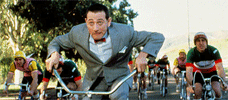
Pee-wee’s Big Adventure
1985 -

The Matrix
1999 -
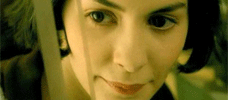
Amélie
2001 -
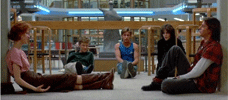
The Breakfast Club
1985 -
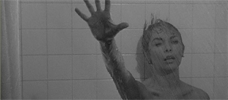
Psycho
1960 -
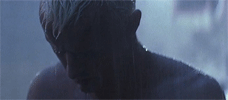
Blade Runner
1982 -
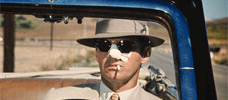
Chinatown
1974 -
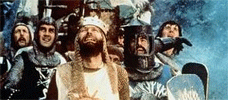
Monty Python and the Holy Grail
1975 -
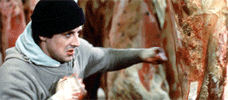
Rocky
1976 -
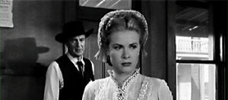
High Noon
1952 -
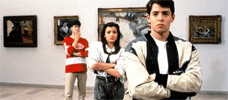
Ferris Bueller’s Day Off
1986 -
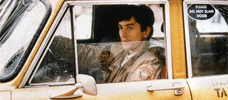
Taxi Driver
1976 -
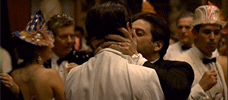
The Godfather
1972 -

E.T.
1982 -
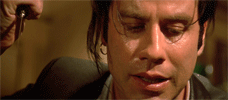
Pulp Fiction
1994
We don’t do comments anymore, but you may contact us here or find us on Twitter or Facebook.



